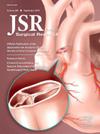外科住院医师对围产期住院医师政策的体验:一项定性研究
IF 1.8
3区 医学
Q2 SURGERY
引用次数: 0
摘要
为了应对外科住院医生产科结局不佳的风险增加,2019年在一家大型学术机构推出了围产期住院医生政策,在妊娠晚期调整时间表,并提供长达12周的育婴假。目的是评估围产儿住院医师政策实施后外科住院医师的经验和看法。方法于2023年8月至2024年1月进行定性研究和分析。采用解释性描述对数据进行分析。至少在研究生二年级的单个高容量学术机构的外科住院医师有资格参加。参与者分享了他们在围产期住院医师政策方面的经验,以及该政策如何在外科住院医师中使用。结果共纳入符合条件的外科住院医师19/50(有效率38%),其中年龄中位数为31岁,女性13人(68%),有子女的5人(26%)。三个主要主题包括:(1)委员会认证休假与机构政策之间的紧张关系,(2)住院医师零和制度中允许灵活性的紧张关系,以及(3)将自己放在第一位与外科专业规范之间的紧张关系。尽管存在这些挑战,居民们还是支持这项政策,并认为外科文化总体上受益于这项政策。结论本定性研究发现,尽管面临挑战,外科住院医师仍支持怀孕住宿和育儿假。虽然需要进一步努力克服围产期支持方面的障碍,但更多的方案可以考虑实施家庭友好政策的方法。本文章由计算机程序翻译,如有差异,请以英文原文为准。
Surgical Residents’ Experience With a Perinatal Resident Policy: A Qualitative Study
Introduction
In response to increased risk of poor obstetric outcomes in surgical residents, a perinatal resident policy was introduced in 2019 at a single, high-volume academic institution, providing schedule adjustments during the third trimester and up to 12 wk of parental leave. The objective was to evaluate surgical residents’ experiences and perceptions after implementation of a perinatal resident policy.
Methods
This qualitative study and analysis was performed from August 2023 to January 2024. Interpretive description was applied to analyze the data. Surgical residents at a single, high-volume academic institution who were at least in their second postgraduate year were eligible to participate. Participants shared their experience with a perinatal resident policy and how the policy was used in a surgical residency.
Results
A total of 19/50 eligible (38% response rate) surgical residents (median age: 31, 13 (68%) females, and 5 (26%) with children) were interviewed. Three main themes included (1) tension between leave allowed for board certification versus institutional policy, (2) tension of allowing flexibility in the zero-sum system of residency, and (3) tension between putting oneself first with surgical professional norms. Despite these challenges, residents were supportive of the policy and felt that surgical culture overall benefitted from such policies.
Conclusions
This qualitative study found that despite challenges, surgical residents were in support of pregnancy accommodations and parental leave. Although further efforts to overcome barriers to perinatal support are necessary, more programs could consider ways to implement family friendly policies.
求助全文
通过发布文献求助,成功后即可免费获取论文全文。
去求助
来源期刊
CiteScore
3.90
自引率
4.50%
发文量
627
审稿时长
138 days
期刊介绍:
The Journal of Surgical Research: Clinical and Laboratory Investigation publishes original articles concerned with clinical and laboratory investigations relevant to surgical practice and teaching. The journal emphasizes reports of clinical investigations or fundamental research bearing directly on surgical management that will be of general interest to a broad range of surgeons and surgical researchers. The articles presented need not have been the products of surgeons or of surgical laboratories.
The Journal of Surgical Research also features review articles and special articles relating to educational, research, or social issues of interest to the academic surgical community.

 求助内容:
求助内容: 应助结果提醒方式:
应助结果提醒方式:


